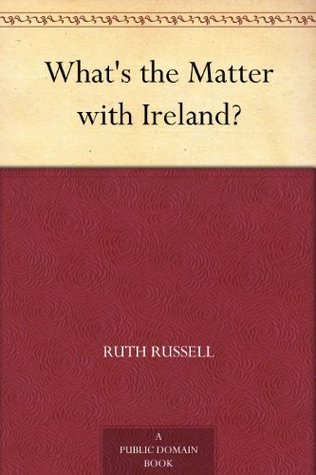by BARRA O’ SEAGHDHA

An American journalist sympathetic to the causes of labour, the emancipation of women and Ireland’s liberation from British rule shaped her journalism into a book. Soon enough, she disappeared into the quiet obscurity of a worthy teaching life. Ruth Russell’s account of her Irish experiences, What’s the Matter with Ireland?, disappeared into obscurity too, surfacing occasionally decades later in a footnote here and a passing reference there. My purpose here is not to investigate a hidden life (Mark Holan seems to have uncovered as much about Russell as is knowable), or to reflect on the different reasons that certain books languish in darkness, but to demonstrate the value and interest of the impressions, perspectives and perceptions gathered in one such neglected work.
One of the surprises of What’s the Matter with Ireland? lies in the fact that it contains a prefatory letter ‘(signed) Eamon de Valéra’. This is addressed from the ‘Elected Government of The Republic of Ireland (American delegation)’ to ‘Miss Ruth Russell, Chicago, Illinois’ and dated January 29th, 1920. We know how important a role the amplifying voice and the financial support of Irish America would play in de Valera’s political life. Do we know whether he really read the book ‘with much interest’ as the letter affirms in congratulating Russell on ‘the rapidity with which [she] succeeded in understanding Irish conditions and grasped the Irish viewpoint?’ Did he read or skim beyond the first chapter (the only one specifically mentioned)? Whether he wrote or dictated this letter, or delegated the task to a subordinate, the content, apart from some unattributed lines of verse (‘There never was a nation yet / Could rule another well’), places de Valera in the line of Davis and Griffith. Russell, having seen the nature of British rule here, must realise ‘better than before what it was your American patriots of ’76 hastened to rid themselves of’. And de Valera’s economic and political thinking, while it shows concern at unemployment and the misery of the poor, seems to assume that independence will, almost of its nature rather than through a solidly worked out economic programme, bring about prosperity:
In a country with such natural resources as Ireland, can you believe it possible that if government by the people obtained there could be such conditions of unemployment and misery as you found?
He invokes Lord Clare’s claim in 1798 (‘There is not a nation on the face of the habitable globe which has advanced in cultivation, in manufactures, with the same rapidity in the same period as Ireland – from 1782 to 1798’) to suggest that ‘progress like this, with the present social outlook in Ireland, would mean the peace, contentment and happiness of millions of human beings’. Though neither Lord Clare’s economic stewardship nor his anti-Catholic invective and obstructionism would mark him out as an obvious authority within de Valera’s ideological universe, the quote from him, plucked from its context, could be usefully deployed in the cause of Irish independence. We can imagine that de Valera at this stage in his career looked forward to an independent Ireland that would lift the ordinary poor out of misery (and we should not forget that the Fianna Fáil governments of the 1930s enacted some progressive policies in areas such as housing and the encouragement of small industry). If Ruth Russell’s political views at this stage were more radical than those of Sinn Féin, it was more important to add another sympathetic voice to the pro-independence chorus in the United States than to quibble over the arrangement of the hymns to be sung.
Dublin Review of Books for more
